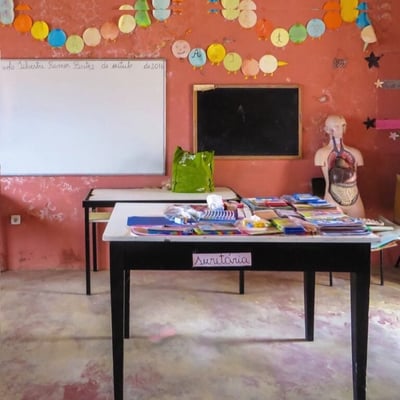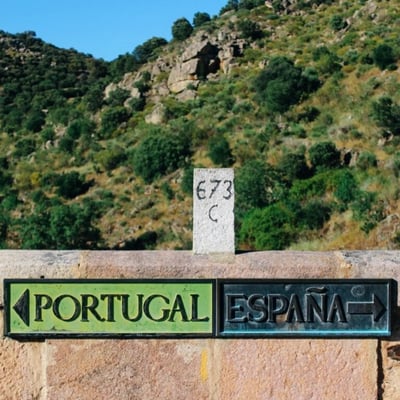We've unlocked the Premium Features for this special episode! Members get access to features just like this across our entire library. Learn More
Please request our permission before redistributing these files.
- Susana: (ao telefone) Vim ao supermercado fazer as compras para o nosso lanche.
- Vou agora pagar.
- Levo aquelas bolachas com recheio de chocolate de que tu gostas...
- Levo pão também...
- Duzentos gramas de queijo e cento e cinquenta gramas de fiambre
- para fazermos as sandes...
- E laranjas para fazer sumo.
- Chegas às 4h30, não é?
- Combinado!
- Agora vou ter de desligar,
- já estou na caixa para pagar.
- Até logo!
- Empregado: Boa tarde.
- Precisa de saco?
- Susana: Sim.
- Um saco de papel, por favor.
- Empregado: Aqui tem.
- Susana: Não encontrei as balanças para pesar a fruta.
- Vocês pesam aqui?
- Empregado: Sim, nós pesamos a fruta aqui na caixa.
- Susana: Ótimo!
- É muito mais prático assim.
- Reparei que os frutos secos estão em promoção.
- Sabe dizer-me até quando?
- Empregado: As nossas promoções vão durar o fim de semana inteiro.
- Susana: Passo cá amanhã, então.
- Empregado: São onze euros e sessenta cêntimos.
- Vai pagar em dinheiro ou com cartão?
- Susana: Vou pagar com cartão.
- Empregado: Quer número de contribuinte?
- Susana: Sim.
- É o um, dois, dois, três, cinco, cinco, sete, oito, oito.
- Empregado: Tem aqui o seu talão.
- Susana: Obrigada, boa tarde!
agoranow amanhãtomorrow aquihere specific assimthus, therefore, accordingly, like that, so atéeven, until, up to BalançasScales as bolachascookies, biscuits a caixabox o cartãocard o chocolatechocolate cáhere general desligarto disconnect, turn off, hang up the phone o dinheiromoney, cash durarto last EntãoSo, Then fazerto do, to make o fiambresliced ham, cold cuts frutafruit os frutos secosthe nuts gramasgrams inteirowhole, entire, complete jáalready, yet, right now, ever o lanchesnack as laranjasoranges nossoour, ours pagarto pay papelpaper Pesarto weigh práticopractical o pãobread quandowhen queijoCheese o recheiothe filling o sacobag A sandessandwich o sumojuice o supermercadosupermarket o talãoreceipt ÓtimoGreat
Boa tardeGood afternoon Por favorPlease ObrigadaThank you female speaker Até logo!See you later! Número de ContribuinteTaxpayer number, NIF Em promoçãoOn sale, On offer o fim de semanaweekend Fazer as comprasDo the shopping Passo cáI'll stop by, I'll come by, I'll pass by Reparei que...I noticed that... Aqui temHere you go sing.,formal Precisa de saco?Do yousing.,formal need a bag? combinadoscheduled, arranged, combined
 We respect your privacy and have a ZERO TOLERANCE for spam.
We respect your privacy and have a ZERO TOLERANCE for spam.

















For obvious reasons I can’t come to Portugal just now but this digital exercise has taken me to my favourite destination and in my mind I am standing in the queue at Continente in Tavira………..it has cheered me a lot!
Ou eu poderia estar comprando frango assado no Pingo Doce ou comendo peixe no Restaurante Fialho em Pinheiro perto da lagoa ……… infelizmente apenas sonha no momento!! Está chuvendo aqui em Inglterra.
Please please make some more shorties for us who has to stay home … these shorties are a drop of happiness in this crazy world 🙂
Thank you, you are great!!!!
You got it, Miriam! Starting today, we’re going to increase Shorty production and try to release one per day for as long as we can. We hope that helps make these crazy times a little more tolerable… Thanks for your support!
Thanks, Molly and Team! Needless to say, we cancelled this week’s trip to Portugal, but I am still practicing in the hope of going later this year. Best regards to all during this difficult period. This too shall pass!
How fantastic!! These are perfect. Keep them coming. Muito obrigada
Just a quick question. ‘Os frutos secos’ is translated as nuts in the dialogue. I would have thought it should be dried fruit. Am I wrong? Does this maybe include nuts in Portuguese?
Good question – even though the literal translation becomes “dry fruits”, “os frutos secos” does indeed refer to “nuts”. You can think of the word “fruto” (with an “o”) as a sort of general term for the fruit of a plant (with nuts being considered a fruit in this sense), whereas “fruta” (with an “a”) is the word for what we more commonly think of as fruit, like apples, bananas, pears, etc.
I suggest making a shorty with someone doing physical exercises and the trainer instructing her on how to do the exercises better. This way we get more vocabularies on body parts, etc…
That’s a great idea – I’ll add it to the list! It would be a good way to learn about body parts and also some relevant verbs for different types of movements and exercise. In the meantime, you could check out our units Body Parts 1 and Body Parts 2.
This is also true also for Italian (which I also speak). In Italian you say “frutta secca”, and I too was thinking that sounded strange when talking about nuts. Then when I listened to this Portuguese dialogue I just automatically associated “frutos secos” with nuts.
Great comments with excellent replies. Yes more shorties with day to day situations.
Another suggestion: Is it possible to get units where the speaker asks questions and the student tries to reply …either written or verbal…Thank you.
Thanks so much for the feedback! This is similar to one of the ideas on our list, so I’ll add your vote. I like that idea too! 🙂
Is “nozes” an alternative for “nuts”? And if you actually wanted to buy dried fruit instead of nuts, how would you say it?
Olá, Peter. Maybe in theory yes, but in practice we use nozes specifically for walnuts, not nuts in general – so, to be easily understood, you should use frutos secos when you talk about all nuts. To buy dried fruits, you should ask for fruta desidratada or fruta seca.
What is common in the US and Canada are mixed nuts, a combination of all the common types of nuts (although not usually walnuts for some reason). DeepL suggests porcas mistas for this. Is this another misfire by DeepL?
Haha, yes, it is. “Porca” means “nut” as in the piece of hardware that goes with a bolt. In this case, you just want “frutos secos”.
We ( husband and I) listen to a shortie everyday. Apart from listening practice they form the basis of lots of other learning. We normally listen a couple of times without looking at the transcription, then line by line making our own translation. Then we look at the vocabulary and expressions. Then we read the whole text aloud. Sometimes we verb spot ie identify tense or verb mood. This particular shortie led us to revise Vir in the past tense. To look up the various meaning of reparar. To explore the differences between levar, apanhar, tomar , tirar and pegar. We also look through all the comments because like today they alert us to things we either miss or answer questions we have. So today the whole thing about frutos secos, fruta desitratada, frutas secos was very interesting. All this usually takes about an hour. So thank you for all the time you put into designing these shorties and for making them so entertaining and launchpad for other learning.
Thanks for sharing! Love to hear when members find creative ways to learn from the Shorties. Applying and expanding upon what you’ve learned is an excellent strategy. 🙂
Peço desculpe. Faço tantas perguntas.
No supermercado, como se chama a pratelaira onde se põe as compras antes de pagar. Está é a tapete rolante. O balcão rolante ou outro mome?
Olá, David. Penso que este teu comentário ficou aqui perdido por muito tempo – desculpa! Chamamos de tapete rolante ou simplesmente tapete 🙂
1-Qual é a diferência entre: Pagar com cartão e pagar com multibanco?
2- Na pergunta: Arranja-me um saco? está a falar com o empregado no trato formal (você). No imperativo seria: Arranje-me um saco! Não é?
Olá, Manuel!
1 – Cartão é o objeto físico; multibanco é o sistema através do qual o pagamento com cartão é processado. Na prática, usar uma expressão ou outra tem exatamente o mesmo objetivo e resultado, portanto podemos considerar que não tem diferença 🙂
2 – Certíssimo!
Muito obrigado pela resposta. Muito bom trabalho👏
Why is “número” used without the article in this sentence or is it optional and if so under what condition is this the case:
“Quer número de contribuinte?“
In this case the definite article is optional! Adding the “o” here would just specify a particular “número de contribuinte” (the costumer’s number). Not adding it just sends the same message, but also gives room for the costumer to add any “número de contribuinte” of his/her choosing.
There’s no rule without exceptions! Specially when it comes to European Portuguese. However, the definite article should be used when you want to specify something. Not adding it, makes it more general.
I’ll add that I rarely hear “número de” in this situation. It’s usually just, “Quer contribuinte na fatura?” (Also, not sure if it’s a northern thing, but up here I almost never hear “talão”, just “fatura”)
I’m wondering about the colloquial use of ‘combinado’ in this context, in British and Australian English at least. In the audio clip “No Supermercado, At the Supermarket” it appears as a single word to complete a chat. Surely ‘combinado’ is better translated nowadays as “sorted”. I reference Cambridge Dictionary:
Debbie’s sorted for Tuesday night because she’s found a babysitter.
or
“Have you spoken to Grant about the party?” “Sorted!”
Another possible translation for “Combinado!” in this context could be “That’s settled then!” 🙂